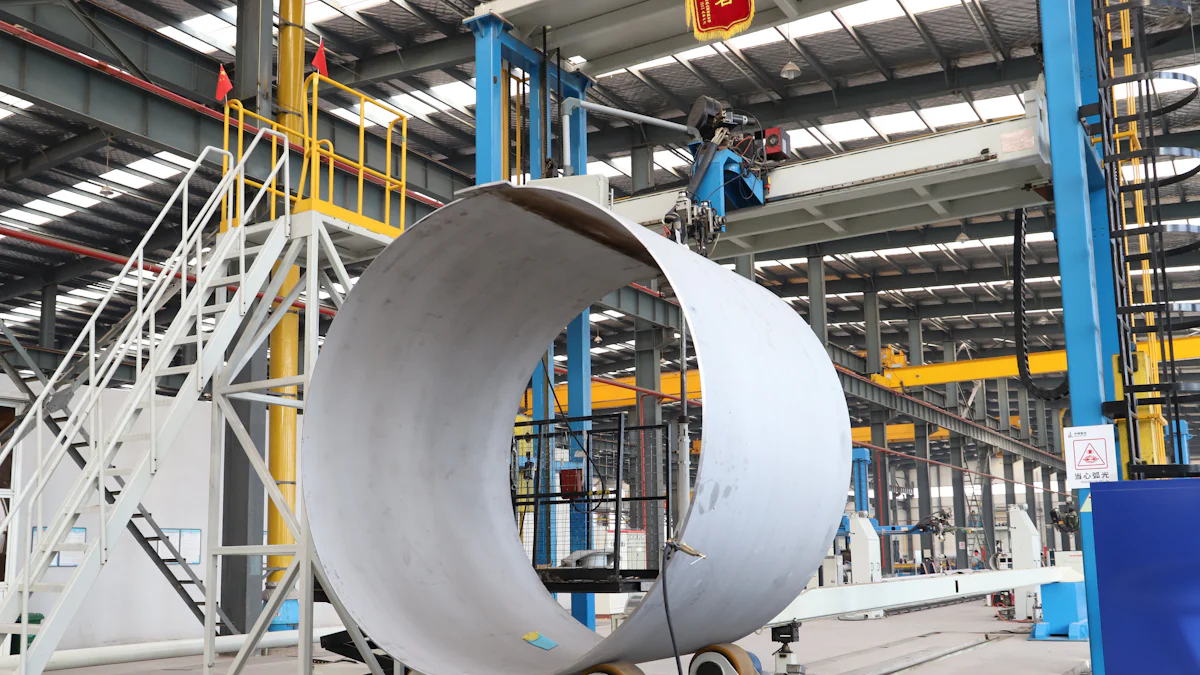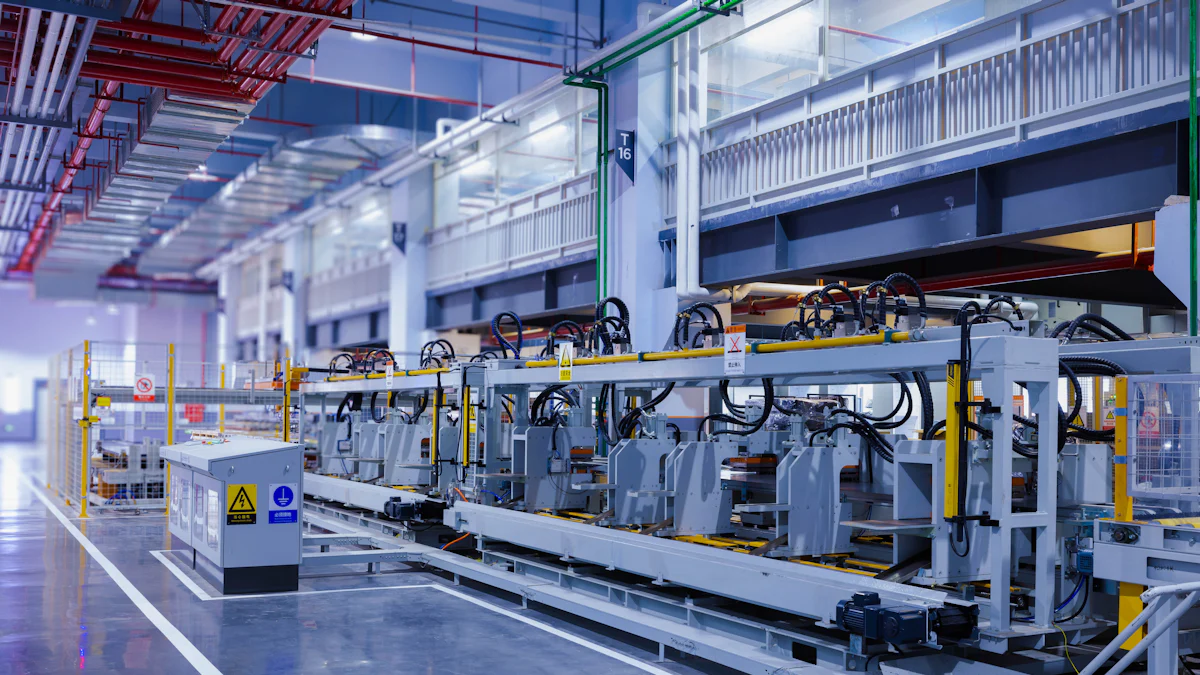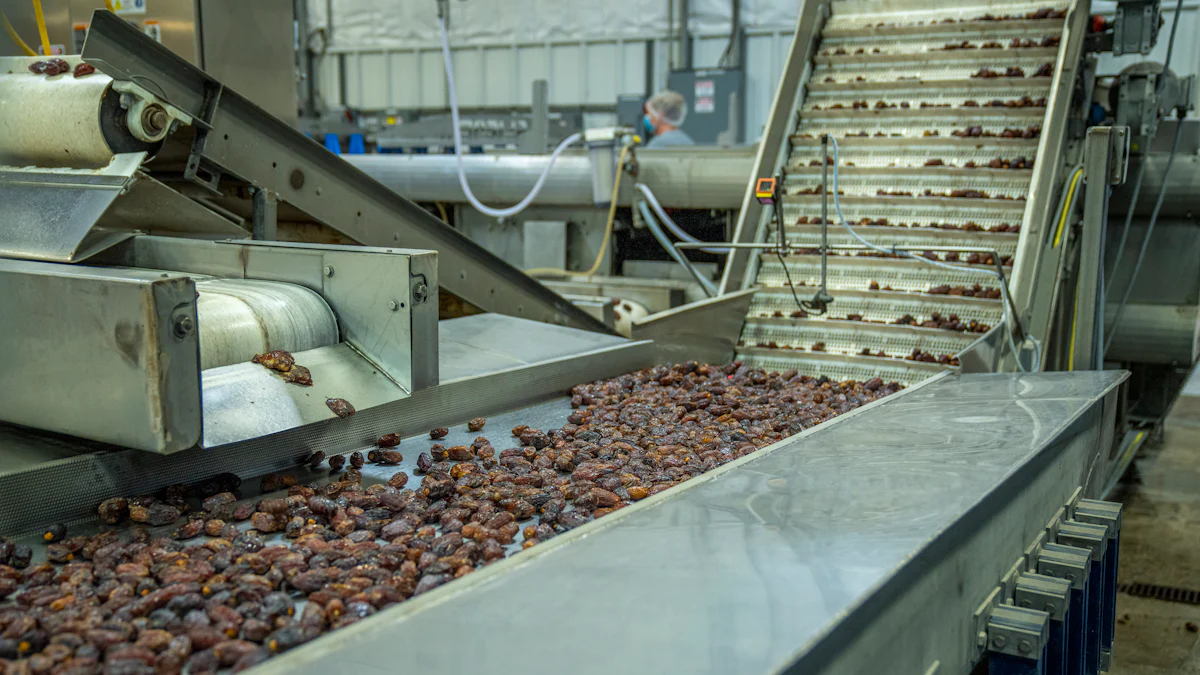the mainstream CFR-12JB-52-110R production process

The CFR-12JB-52-110R is a carbon film resistor widely used in various industries. It plays a critical role in ensuring stable electrical performance across diverse applications. You will find it essential in automotive systems due to its compliance with AEC-Q200 standards. The mainstream production process of this resistor ensures precision, reliability, and scalability. Understanding this process helps you appreciate the advanced techniques and materials involved. Whether you are a professional or an enthusiast, exploring this process enhances your knowledge of modern resistor manufacturing.
Key Takeaways
- The CFR-12JB-52-110R resistor is essential for reliable performance in automotive and industrial applications, thanks to its compliance with AEC-Q200 standards.
- Understanding the production process, from high-grade ceramic rods to advanced coating techniques, enhances your appreciation for the precision and reliability of these resistors.
- Automation in manufacturing ensures consistent quality and efficiency, reducing errors and allowing for scalable production to meet varying demands.
- Rigorous quality control measures, including multiple checkpoints and final testing, guarantee that each resistor meets strict performance standards.
- The use of environmentally friendly practices in production, such as energy-efficient machinery and recycling programs, supports sustainability in the industry.
- Future trends in resistor production focus on innovations in automation and material science, promising improved efficiency and reduced environmental impact.
Overview of CFR-12JB-52-110R and Its Applications
What is CFR-12JB-52-110R?
The CFR-12JB-52-110R is a carbon film resistor designed for precision and reliability. It features a resistance value of 110 ohms with a tolerance of ±5%. This resistor operates at 1/6 watt, making it suitable for low-power applications. Manufacturers use high-grade ceramic rods as the base material, coated with a homogeneous layer of pure carbon film. This design ensures stable electrical performance across a wide temperature range, from -55°C to 155°C. Its compliance with AEC-Q200 standards highlights its suitability for automotive and other demanding environments.
Common applications of CFR-12JB-52-110R in various industries
You will find the CFR-12JB-52-110R used in a variety of industries due to its versatility and reliability. In automotive systems, it plays a critical role in advanced driver assistance systems (ADAS), ensuring stable performance under fluctuating temperatures. Building automation systems also rely on this resistor for efficient and consistent operation. Wireless infrastructure benefits from its precision, as it supports stable signal transmission. Its compact axial design makes it ideal for space-constrained applications, further expanding its usability.
Why CFR-12JB-52-110R is essential in its field
The CFR-12JB-52-110R stands out because of its ability to deliver consistent performance in challenging conditions. Its carbon film construction provides excellent stability, even when exposed to temperature variations. This makes it indispensable in automotive and industrial applications where reliability is non-negotiable. The resistor's cost-effectiveness and scalability also make it a preferred choice for manufacturers. By using this component, you ensure that your systems maintain high performance while adhering to industry standards.
Key Materials and Technologies in the Mainstream Production Process
High-grade ceramic rods and carbon film as core materials
The production of the CFR-12JB-52-110R begins with selecting high-grade ceramic rods. These rods serve as the foundation for the resistor, providing structural stability and thermal resistance. You will notice that manufacturers prioritize ceramic rods because they withstand extreme temperatures without compromising performance. This ensures the resistor remains reliable in demanding environments.
Pure carbon film is another essential material in this process. Manufacturers coat the ceramic rods with a homogeneous layer of carbon film. This film determines the resistor's electrical properties, such as resistance value and tolerance. The uniformity of the carbon layer ensures consistent performance across all units. By combining these two materials, you achieve a balance of durability and precision in the final product.
Use of advanced machinery for coating and grooving
Advanced machinery plays a critical role in the production process. Automated coating machines apply the carbon film onto the ceramic rods with remarkable accuracy. This ensures that each rod receives an even layer of carbon, which is vital for maintaining consistent electrical properties. You can appreciate how this precision reduces variability between resistors, enhancing their reliability.
After coating, specialized grooving machines cut a helical groove into the carbon film. This groove adjusts the resistance value of the resistor to meet specific requirements. The machinery operates with high precision, ensuring that the groove depth and spacing are uniform. This step is crucial for achieving the desired electrical characteristics of the CFR-12JB-52-110R.
Role of automation in ensuring precision and efficiency
Automation drives the efficiency and accuracy of the mainstream production process. Automated systems handle tasks like coating, grooving, and quality checks with minimal human intervention. This reduces the likelihood of errors and ensures that every resistor meets strict quality standards. You benefit from this automation because it guarantees consistent product quality.
Automation also speeds up production. Machines operate continuously, producing large quantities of resistors in a short time. This scalability makes the process cost-effective, allowing manufacturers to meet high demand without compromising quality. By relying on automation, the industry achieves a perfect blend of precision, efficiency, and reliability.
Step-by-Step Breakdown of the Mainstream Production Process

Stage 1: Preparation of high-grade ceramic rods.
The production process begins with the selection and preparation of high-grade ceramic rods. You will notice that manufacturers prioritize rods with excellent thermal resistance and structural integrity. These rods undergo thorough inspection to ensure they meet strict quality standards. Any imperfections, such as cracks or irregularities, are removed to maintain consistency in the final product. After inspection, the rods are cut into precise lengths to match the specifications of the resistor. This step ensures that every rod serves as a reliable foundation for the next stages of the mainstream production process.
Stage 2: Coating of pure carbon film on ceramic rods.
Once the ceramic rods are prepared, the coating process begins. Automated machinery applies a homogeneous layer of pure carbon film onto each rod. This carbon film determines the resistor's electrical properties, including its resistance value and tolerance. You will find that the uniformity of this coating is critical. Any inconsistencies in the carbon layer can lead to variations in performance. Manufacturers use advanced techniques to ensure the carbon film adheres evenly to the rod's surface. This step is essential for achieving the precision and reliability expected from the mainstream production process.
Stage 3: Cutting a helical groove in the resistive film.
After the carbon film is applied, the next step involves cutting a helical groove into the resistive layer. Specialized grooving machines perform this task with remarkable accuracy. The groove adjusts the resistance value of the resistor by altering the path of the electrical current. You will see that the depth and spacing of the groove are carefully controlled to meet specific design requirements. This stage not only fine-tunes the resistor's electrical characteristics but also ensures consistency across all units. The precision of this step highlights the advanced technology used in the mainstream production process.
Stage 4: Application of protective coating and marking.
The next step in the mainstream production process involves applying a protective coating to the resistor. This coating shields the carbon film and ceramic rod from environmental factors like moisture, dust, and temperature fluctuations. Manufacturers use specialized equipment to ensure the coating covers the entire surface evenly. You will notice that this layer not only enhances durability but also maintains the resistor's performance over time. The protective coating plays a vital role in extending the lifespan of the CFR-12JB-52-110R.
After the coating dries, the marking process begins. Each resistor receives clear and precise markings that indicate its resistance value, tolerance, and other specifications. Automated machines handle this task with high accuracy. These markings help you quickly identify the resistor's properties during installation or maintenance. By ensuring the markings are legible and durable, manufacturers make it easier for you to use the resistor in various applications.
Stage 5: Final testing, packaging, and distribution.
Once the protective coating and markings are complete, the resistors undergo rigorous testing. Manufacturers perform electrical tests to verify that each unit meets the required resistance value, tolerance, and performance standards. You can trust that these tests ensure the resistor functions reliably under different conditions. Additional inspections check for physical defects, such as cracks or uneven coatings. This thorough quality control process guarantees that only high-quality resistors reach the market.
After passing all tests, the resistors move to the packaging stage. Manufacturers use secure and compact packaging to protect the resistors during transportation. You will find that the packaging often includes labels with essential details, making it easier to identify and organize the products. Once packaged, the resistors are ready for distribution. They are shipped to various industries and retailers, ensuring you have access to reliable components for your projects.
Quality Control Measures and Industry Standards

Key quality control checkpoints during production
You will find that quality control plays a vital role in the production of CFR-12JB-52-110R resistors. Manufacturers implement multiple checkpoints to ensure every unit meets strict standards. These checkpoints begin with the inspection of raw materials. High-grade ceramic rods and pure carbon film undergo thorough evaluation to confirm their suitability. Any material that fails to meet the criteria is immediately discarded.
During the production process, automated systems monitor critical steps like coating and grooving. These systems detect inconsistencies in the carbon film layer or helical groove dimensions. If any irregularities arise, the affected units are removed from the production line. This ensures that only resistors with precise electrical properties proceed to the next stage.
Final testing serves as the most rigorous checkpoint. Each resistor undergoes electrical tests to verify its resistance value, tolerance, and performance under simulated conditions. Physical inspections also check for defects like cracks or uneven coatings. These measures guarantee that you receive a product that performs reliably in your applications.
Compliance with AEC-Q200 automotive standards
The CFR-12JB-52-110R complies with AEC-Q200 automotive standards, which are among the most stringent in the industry. These standards ensure that the resistor can withstand the demanding conditions of automotive environments. You can trust that this compliance guarantees high reliability and durability.
To meet these standards, manufacturers subject the resistors to rigorous testing. These tests include thermal cycling, mechanical shock, and vibration resistance. Each test simulates real-world conditions to confirm the resistor's performance. By adhering to AEC-Q200 standards, the CFR-12JB-52-110R becomes a dependable choice for automotive systems.
This compliance also benefits you in other industries. The same qualities that make the resistor suitable for automotive use—such as stability and durability—enhance its performance in industrial and electronic applications. You can rely on this component to deliver consistent results across various environments.
Ensuring performance stability across temperature variations
Temperature stability is a critical feature of the CFR-12JB-52-110R. This resistor maintains reliable performance across a wide temperature range, from -55°C to 155°C. You will appreciate this stability, especially in applications where temperature fluctuations are common.
Manufacturers achieve this stability through careful material selection and precise production techniques. High-grade ceramic rods provide excellent thermal resistance, while the carbon film layer ensures consistent electrical properties. The helical groove design further enhances the resistor's ability to handle temperature changes without compromising performance.
Testing confirms this stability. Resistors undergo thermal shock tests to evaluate their performance under sudden temperature changes. These tests ensure that the resistor remains functional and reliable. By choosing the CFR-12JB-52-110R, you gain a component that performs consistently, even in challenging thermal conditions.
Advantages of the Mainstream Production Process
Cost-effectiveness and scalability of the process
The mainstream production process for CFR-12JB-52-110R resistors offers significant cost advantages. Manufacturers use automated systems to streamline production, which reduces labor costs and minimizes material waste. You benefit from this efficiency because it keeps the price of these resistors affordable without compromising quality. The use of advanced machinery ensures that each step, from coating to grooving, is optimized for maximum output. This approach allows manufacturers to produce large quantities of resistors quickly, meeting high demand while maintaining cost-effectiveness.
Scalability is another key advantage. The production process adapts easily to varying levels of demand. Whether you need a small batch for a specific project or a large volume for mass production, the process can accommodate your requirements. This flexibility ensures that you always have access to reliable components, regardless of the scale of your application. By relying on this scalable process, manufacturers can maintain consistent supply chains and meet the needs of diverse industries.
Consistency in product quality and reliability
The mainstream production process prioritizes consistency in every resistor it produces. Automated systems handle critical tasks like coating and grooving with precision, ensuring uniformity across all units. You can trust that each resistor will perform as expected, regardless of the batch it comes from. This consistency is vital for applications where reliability is non-negotiable, such as automotive systems and industrial equipment.
Quality control measures further enhance reliability. Manufacturers implement rigorous testing at multiple stages of production. These tests verify that each resistor meets strict electrical and physical standards. By maintaining high-quality standards, the process ensures that you receive components that perform reliably in even the most demanding conditions. This focus on consistency and reliability makes the mainstream production process a benchmark in the industry.
Environmental considerations and sustainability efforts
The mainstream production process incorporates environmentally friendly practices to minimize its impact on the planet. Manufacturers use materials like high-grade ceramic rods and pure carbon film, which are chosen for their durability and efficiency. These materials reduce waste by extending the lifespan of the resistors, ensuring that fewer components need replacement over time. You contribute to sustainability by choosing products made through this process.
Energy-efficient machinery plays a crucial role in reducing the environmental footprint of production. Automated systems operate with minimal energy consumption, lowering greenhouse gas emissions. Some manufacturers also implement recycling programs to repurpose leftover materials, further reducing waste. By adopting these practices, the mainstream production process aligns with global efforts to promote sustainability. When you select resistors produced through this process, you support environmentally responsible manufacturing.
Challenges and Future Trends in CFR-12JB-52-110R Production
Current challenges in material sourcing and production
You may notice that sourcing high-grade materials for CFR-12JB-52-110R resistors presents significant challenges. Manufacturers rely on ceramic rods and pure carbon film, which require strict quality standards. Limited availability of these materials often leads to supply chain disruptions. This scarcity can delay production schedules and increase costs. You might also find that geopolitical factors and fluctuating raw material prices further complicate sourcing efforts.
Production challenges also arise from the need for precision. Every step, from coating to grooving, demands advanced machinery and skilled operators. Even minor errors can result in defective resistors. Manufacturers must invest heavily in technology and training to maintain quality. These challenges highlight the complexity of producing reliable components like the CFR-12JB-52-110R.
Innovations in automation and material science
Advancements in automation continue to transform the production process. You will see that modern machinery now performs tasks like coating and grooving with unparalleled accuracy. These innovations reduce human error and improve efficiency. Automated quality control systems also play a crucial role. They detect defects in real-time, ensuring that only high-quality resistors reach the market.
Material science is another area of rapid progress. Researchers are developing alternative materials to replace traditional ceramic rods and carbon film. These new materials aim to offer better performance and sustainability. For example, you might encounter resistors made from composite materials that enhance thermal resistance and durability. These innovations promise to address current challenges while opening new possibilities for resistor design.
Potential improvements to enhance efficiency and sustainability
You can expect future improvements in the production process to focus on efficiency and sustainability. Manufacturers are exploring energy-efficient machinery to reduce operational costs and environmental impact. These machines consume less power while maintaining high output levels. By adopting such technologies, the industry aims to lower its carbon footprint.
Sustainability efforts also include recycling programs. You may find that manufacturers are reusing leftover materials from the production process. This approach minimizes waste and conserves resources. Additionally, researchers are working on biodegradable coatings and eco-friendly packaging solutions. These advancements align with global sustainability goals and benefit you by offering environmentally responsible products.
The mainstream production process of the CFR-12JB-52-110R showcases a perfect blend of precision, efficiency, and innovation. You have seen how each stage, from material selection to final testing, ensures consistent quality and reliability. This process not only meets industry demands but also adapts to evolving technological advancements. By understanding this process, you gain insights into how manufacturers achieve scalability while maintaining high standards. Innovation continues to shape the future of this production, promising even greater efficiency and sustainability in the years ahead.
FAQ
What is the CFR-12JB-52-110R resistor used for?
The CFR-12JB-52-110R resistor serves various industries, including automotive, industrial, and electronics. You will find it essential in applications like advanced driver assistance systems (ADAS), building automation, and wireless infrastructure. Its precision and reliability make it a preferred choice for systems requiring stable electrical performance.
Why is the carbon film material important in this resistor?
The carbon film layer determines the resistor's electrical properties, such as resistance value and tolerance. Manufacturers use pure carbon film to ensure consistent performance across all units. This material also enhances the resistor's stability under temperature variations, making it reliable in demanding environments.
How does the helical groove affect the resistor's performance?
The helical groove adjusts the resistor's resistance value by altering the electrical current's path. You will notice that this precise grooving ensures the resistor meets specific design requirements. It also contributes to the consistency of electrical characteristics across all units.
What makes the CFR-12JB-52-110R suitable for automotive applications?
This resistor complies with AEC-Q200 automotive standards, ensuring it can withstand harsh conditions like temperature fluctuations, mechanical shocks, and vibrations. Its wide operating temperature range (-55°C to 155°C) and stable performance make it ideal for automotive systems.
How does automation improve the production process?
Automation enhances precision and efficiency in every production stage. Machines handle tasks like coating, grooving, and quality checks with minimal errors. You benefit from this automation because it ensures consistent product quality and reduces production costs.
What are the key quality control measures during production?
Manufacturers implement strict quality control at every stage. They inspect raw materials, monitor coating and grooving processes, and perform rigorous electrical and physical tests. These measures ensure you receive a reliable and high-quality resistor.
How does the production process support sustainability?
The production process incorporates energy-efficient machinery and recycling programs. Manufacturers reuse leftover materials and minimize waste. By choosing this resistor, you support environmentally responsible manufacturing practices.
What challenges do manufacturers face in producing this resistor?
Sourcing high-grade materials like ceramic rods and pure carbon film poses challenges due to limited availability and fluctuating prices. Precision in production also requires advanced machinery and skilled operators, adding complexity to the process.
Are there any future trends in CFR-12JB-52-110R production?
You can expect advancements in automation and material science to shape the future. Innovations like energy-efficient machinery and alternative materials aim to improve efficiency and sustainability. These trends promise better performance and reduced environmental impact.
How can I ensure I am using the resistor correctly?
Always check the resistor's specifications, such as resistance value, tolerance, and operating temperature range. Follow the manufacturer's guidelines for installation and maintenance. Proper usage ensures optimal performance and extends the resistor's lifespan.
See Also
Understanding The Standards For ST-4ETD202 Products
Comparing Variants Of The ST-4ETD202 Model Lineup
Distinctive Features Of The SMT35A-102LF Standards

